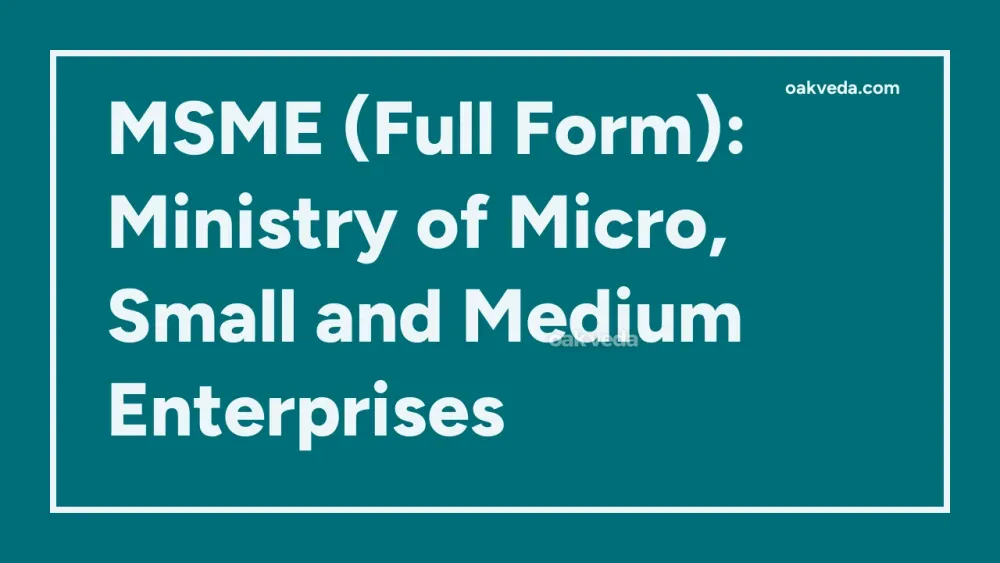
What is the Full Form of MSME?
The full form of MSME is Ministry of Micro, Small and Medium Enterprises. This abbreviation represents a crucial government body in India that plays a vital role in shaping the country's economic landscape.
What is Ministry of Micro, Small and Medium Enterprises?
The Ministry of Micro, Small and Medium Enterprises (MSME) is the apex government body responsible for formulating and implementing policies, regulations, and laws related to micro, small, and medium enterprises in India. As a key division of the Government of India, MSME focuses on promoting and nurturing the growth of smaller businesses, which form the backbone of the Indian economy.
Origin and Development of MSME
The MSME ministry was established to address the unique challenges faced by smaller businesses in India. Its origins can be traced back to the Micro, Small and Medium Enterprises Development (MSMED) Act of 2006, which provided a legal framework for the definition and development of these enterprises.
How does MSME work?
The MSME ministry operates through various schemes, initiatives, and policies designed to support and empower micro, small, and medium enterprises. It works in collaboration with state governments, financial institutions, and other stakeholders to create an enabling environment for these businesses to thrive.
Functions of MSME
The Ministry of Micro, Small and Medium Enterprises performs several crucial functions:
- Policy formulation: Developing and implementing policies to promote MSME growth
- Financial assistance: Facilitating credit flow to MSMEs through various schemes
- Technological upgradation: Encouraging the adoption of modern technologies
- Skill development: Providing training and education for entrepreneurs
- Market access: Assisting MSMEs in accessing domestic and international markets
- Cluster development: Promoting the cluster-based approach for MSME growth
- Research and development: Conducting studies and gathering data on the MSME sector
Applications of MSME
The MSME ministry's work has wide-ranging applications across various sectors of the Indian economy:
- Manufacturing: Supporting small-scale industries and promoting indigenous production
- Services: Enabling growth in sectors like IT, healthcare, and hospitality
- Rural development: Fostering entrepreneurship in villages and small towns
- Employment generation: Creating job opportunities through MSME growth
- Innovation: Encouraging startups and new business ideas
Features of MSME
Key features of the Ministry of Micro, Small and Medium Enterprises include:
- Comprehensive support: Offering assistance at every stage of business development
- Sector-specific approach: Tailoring policies to meet the needs of different industries
- Inclusive growth: Focusing on marginalized sections of society
- Technology-driven: Leveraging digital platforms for better service delivery
- Collaborative ecosystem: Partnering with various stakeholders for holistic development
Benefits of MSME
The MSME ministry's initiatives provide numerous benefits:
- Economic growth: MSMEs contribute significantly to India's GDP
- Job creation: Small businesses are major employers in the country
- Innovation promotion: Encouraging new ideas and technologies
- Regional development: Fostering growth in underdeveloped areas
- Export promotion: Helping MSMEs access international markets
- Skill enhancement: Improving the workforce's capabilities
- Financial inclusion: Bringing more businesses into the formal economy
Limitations or Challenges of MSME
Despite its efforts, the MSME ministry faces several challenges:
- Limited resources: Insufficient funds to meet the sector's vast needs
- Informal sector dominance: Difficulty in reaching unregistered businesses
- Technological gaps: Slow adoption of modern technologies by MSMEs
- Credit accessibility: Persistent issues in securing loans for small businesses
- Regulatory complexities: Navigating complex regulations and compliance requirements
Future Developments in MSME Technology
The MSME ministry is focusing on several technological advancements to enhance its effectiveness:
- Digital platforms: Developing online portals for easier access to services
- AI and machine learning: Implementing smart solutions for better decision-making
- Blockchain: Exploring blockchain technology for transparent and efficient operations
- IoT integration: Encouraging MSMEs to adopt IoT for improved productivity
- Green technologies: Promoting eco-friendly practices in the MSME sector
FAQs on MSME Full Form
-
What are the criteria for MSME classification in India? The classification is based on investment in plant and machinery or equipment, and annual turnover.
-
How does MSME support women entrepreneurs? MSME offers special schemes and incentives for women-owned businesses.
-
What is the role of MSME in the 'Make in India' initiative? MSME plays a crucial role in promoting indigenous manufacturing and reducing import dependence.
-
How can an MSME register with the ministry? Registration can be done online through the Udyam Registration portal.
-
What financial assistance does MSME provide? MSME offers various credit schemes, subsidies, and grants to eligible businesses.
In conclusion, the Ministry of Micro, Small and Medium Enterprises (MSME) is a vital government body that plays a crucial role in nurturing and developing India's small business ecosystem. By providing comprehensive support, formulating targeted policies, and addressing sector-specific challenges, MSME contributes significantly to India's economic growth and employment generation.
You may be interested in:

